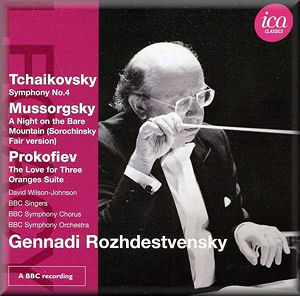 |
 |
|


alternatively
CD: MDT
AmazonUK
AmazonUS
Sound
Samples & Downloads |
Pyotr Ilyich TCHAIKOVSKY (1840-1893)
Symphony No. 4 in F minor, Op. 36 (1877-1878) [42:48]
Modest MUSSORGSKY (1839-1881)
A Night on the Bare Mountain (Sorochinsky Fair version,
completed by Anatoly Liadov)* (1904) [10:46]
Sergei PROKOFIEV (1891-1953)
The Love for Three Oranges – Suite, Op. 33bis (1924) [14:45]
 David Wilson-Johnson (bass baritone)*
David Wilson-Johnson (bass baritone)*
BBC Singers*; BBC Symphony Chorus*
BBC Symphony Orchestra/Gennadi Rozhdestvensky
rec. 1 June 1979, Leeds Music Festival, Leeds Town Hall (Tchaikovsky);
27 July 1981, Royal Albert Hall, London (Mussorgsky); 31 May 1981,
Far East Tour, Kurashiki City Auditorium, Kurashiki, Japan (Prokofiev).
ADD.
Sung texts not included
 ICA CLASSICS ICAC 5035 [68:34]
ICA CLASSICS ICAC 5035 [68:34] 
|
|
|
The redoubtable Rozhdestvensky, chief conductor of the BBC
Symphony Orchestra from 1978 to 1981, is at his very best in
Russian repertoire. Indeed, his Shostakovich has a raw energy
that never fails to excite, so I had high hopes for this recording
of Tchaikovsky’s febrile Fourth. The other items on this disc
– all recorded live by the BBC – make for a sensible and interesting
programme, the rarely heard Sorochinsky Fair version
of Night on a Bald Mountain especially welcome. Also
worthy of note is the growing catalogue of archive material
from the recently launched ICA label, some of it previously
unreleased and much of it – the Tennstedt Mahler 3, for instance
– very desirable indeed.
The upfront blare of horns and bassoons at the start of the
Tchaikovsky gives a clear indication of the character of Rozhdestvensky’s
approach to this score; it’s vital and vigorous, yet the rhythms
of ‘In movimento di Valse’ have grace and charm. The big climaxes
pack a terrific punch – what thrilling timps – the transported
brass scything through the mix like one of those brazen, Soviet-era
performances. That’s not to say it’s over-driven – well, not
yet, anyway – merely that it’s not the carefully sculpted sound-world
of, say, Claudio Abbado (DG) or Lorin Maazel (Telarc). This
uncompromising earthiness is reinforced by a forthright, yet
detailed, recording.
The oboe playing at the start of the Andantino is lovely,
Rozhdestvensky alive to the emotional undertow of this music.
The strings and woodwind are wonderfully alert and ardent, testament
perhaps to Noddy’s rigorous rehearsals, and there’s real nobility
in those big, swelling tunes. Anyone who knows Rozhdestvensky’s
Royal Festival Hall Sleeping Beauty (BBC Legends BBCL
4091-2) will recognise that seemingly intuitive feel for phrasing;
it all sounds so spontaneous. As for the animated pizzicati
of the Scherzo, they have a fleeting, will-o’-the-wisp quality
that’s most engaging.
All that evaporates in the sudden heat of the Allegro con
fuoco. In his autobiography producer John Culshaw tells
the story of how Georg Szell was tricked into taping an ill-tempered
– yet fiery – rendition of this finale, but even he can’t match
the incandescence of Rozhdestvensky’s reading. The BBC brass
and percussion are truly heroic, the orchestra hard-driven yet
coherent to the very end. I listened to this track several times,
scarcely able to believe this music could be taken at such a
lick and not descend into chaos. The instant roar from the otherwise
very quiet audience says it all. A thumping performance, and
a pretty good recording too.
A Night on the Bare Mountain, most often played in Rimsky’s
orchestration, is given here in Anatoly Liadov’s hotch-potch
culled from Mussorgsky’s unfinished opera Sorochinsky Fair.
The change of venue – London’s Royal Albert Hall – and the
very immediate recording add an edge to the choral singing that
brings plenty of piquancy and passion to this strange hybrid.
Remarkably, Rozhdestvensky gets his British forces to play and
sing with all the abandon of their Russian counterparts. What
a team they would have made in Alexander Nevsky. Musically
this is fascinating, with unusual colours and a melting coda.
I’d urge you to give this a try if you don’t already know it.
If not Nevsky, then Prokofiev’s suite from The Love
for Three Oranges will do very nicely, thank you. And so
it proves; ‘The Clowns’ is played with manic energy and ‘The
Magician’ is magnificently malevolent. Prokofiev’s audacious
rhythms and acid colours are superbly caught, ditto the ever-present
percussion and demented brass. As for the March and Scherzo,
they’re imbued with rather more menace than usual, ‘The Prince
and Princess’ as inward and ardent as ever. The scurrying strings
and lancing brass of ‘The Flight’ have seldom emerged with such
ferocity, or the cymbals sizzled so. An ear-blasting
end to a most entertaining collection.
Noddy fans will want this disc, and those who have yet to experienced
his unique blend of eloquence and excitement would do well to
start here. The Tchaikovsky is a stunner, and while the Mussorgsky
is something of a curiosity it’s well worth having. The Prokofiev-on-steroids
is a wild but welcome bonus.
Another fine issue from ICA.
Dan Morgan
http://twitter.com/mahlerei
|
|




 All Nimbus reviews
All Nimbus reviews








